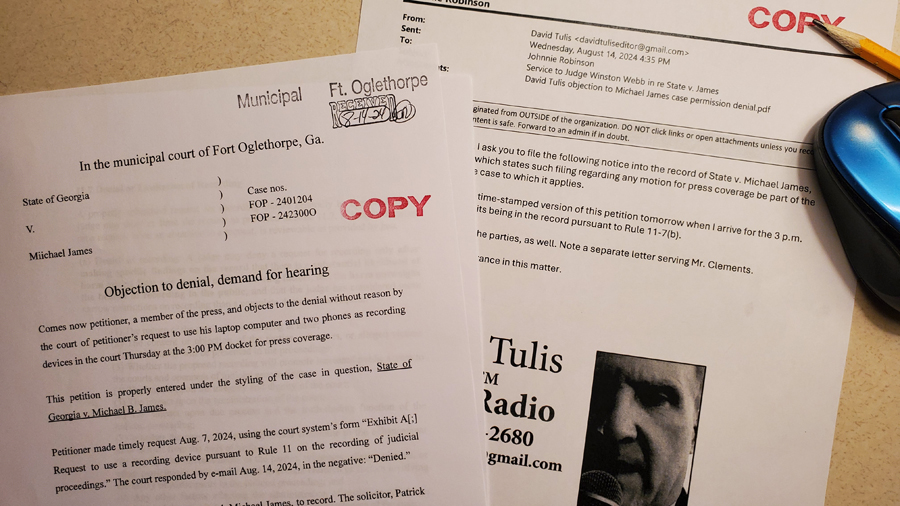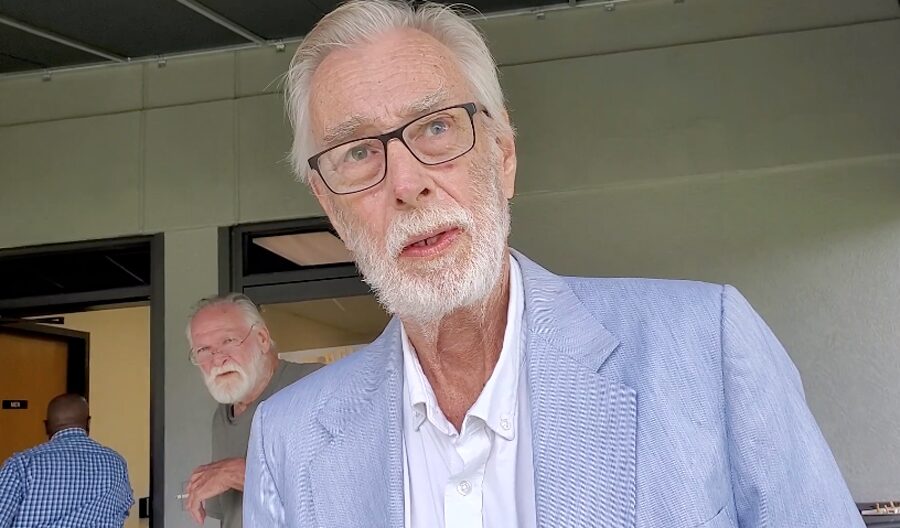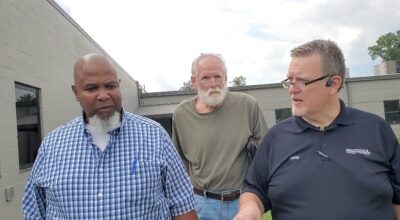
I demand the right to use my laptop Thursday in Fort Oglethorpe, Ga, city court. (Photo David Tulis)

Patrick Clements, Fort Oglethorpe solicitor, says no one has ever before requested to use a laptop and phone as recorder in the court, hence it shouldn’t be allowed. (Photo David Tulis)
FORT OGLETHORPE, Ga., Friday, Aug. 14, 2024 – Municipal Court Judge Winston Webb yields to Georgia’s libertarian laws on press rights, but refuses to accept bedrock legal verities on subject matter jurisdiction by sending downstream a bogus case to trial.
In a hearing at the heel of the docket in a vacant courtroom, Judge Webb calls the case State v. Michael James. Mr. James, a truck driver from Chattanooga, rises. He stands before the wooden table in front of the raised dais behind which the jurist, next to an assistant, presides.
He indicates surprise as this reporter approaches the table next to Mr. James and breaks in. “Excuse me, your honor, but I have a matter that precedes the James case. I am David Tulis, the reporter.”
I insist that my objection to his denial of my request to use my laptop and phone as audio recorder comes first. I intend to cover Mr. James’ hearing and have a right under the rules to not be barred by his “Denied,” said rebuff giving no reasons.
I insist that my request for permission in under Rule 11, and that No. 11.7 controls “denial or limitation of recording. Recording requests “should generally be approved” and that requests and objections are “reviewable as provided by law.
“There must be specific findings on the record,” I say, quoting. “There must be a substantial likelihood of harm” if he accepts my request, and so “you have to weigh the likelihood of harm against my right to make request and get approval. The harm must outweigh the benefit, and you must have grounds for limits or denial based on one or more factors.”
Fort Oglethorpe media filing
“Will this go out on the air on the radio today?” he demands.
“”I’m a journalist. I run Copperhead Radio. have an interest in the public weal and do reports of import to them.”
“No one is stopping you reporting anything,” the judge says. “I said at the beginning of the hearing no video and no audio.”
“I’m not asking for video, sir.”
“You’re asking or audio.”
“For me, as a reporter, I have a right to make a record so I can report. I have a right, and since this is now a matter being adjudicated – this is a public matter, and I am asking for you to change your order, and saying, ‘Sir, the rules are clear.’ And it goes on. There are nine in [Rule] 11.7, if you look further, there are nine grounds that you are required, judge, to give in your order. Your order has to be written. That’s why I responded immediately to your denial,” to give him time to draft the grounds for denial, or change his mind.
Defensive about press coverage
He is looking over a printout from the rules I hand to him. “You know, we’ve never had recordings up until the time I OK’d your request from the last time.”
“OK, yessir. Thank you.”
TAKEAWAY
— I use any rule, statute in my favor
— All U.S. law is in English, and is online
— If I as an amateur can draft a motion citing a law, so can you
— Resistance to my coverage admits corruption, guilty consciences
— City courts are racket protection for occupation armies, namely police departments citizen dopes pay for
“We’re not trying to blow anything up. This is not what I call a national case or a case of jail or anything of that nature, OK? And I can’t see that we’re doing anything wrong as a court. We’ve tried to expedite it, and be out.”
“Well, I’m not making any statements about that, sir, but I’m covering this case because it is in the public interest and a very significant story. May I continue, please, gimme – sir. May I finish, about the rules? Let me just mention quickly, there are nine – sir, I have the floor right now.
Mr. James interrupts: “I didn’t mean to interrupt Mr. Tulis. You said ‘expedite the case.’ Were you dismissing the case? Because, therefore, I’m happy to go.”
The judge chuckles.”
“Sir,” I jump in, “Dismissal — if you did that, it would moot *** my petition. But he’s not making his case now. I’m making my case for your changing your mind about my use of my equipment. And – if I could please continue, sir, on Rule 11.7. There are nine – and I’m not going to mention them all. But your consideration would include ‘the nature of the proceedings.’ And consent. He has not, [solicitor] Mr. [Patrick] Clements has not objected, he just says we haven’t done it before. That’s not an objection.”
Mr. Clements speaks indistinctly about “not familiar” etc.
“Do you object,” I say, turning to him as four FO cops stare at me. “And on what grounds? What grounds to you object on?”
The judge interrupts, “Give him a moment to look at it.”
“I served him yesterday.”
City court clerk Johnnie Anderson had printed it out, since he “doesn’t do e-mail,” another clerk had said. He slumps over my “Objection to denial, demand for hearing,” turning the page.
Four officers and the judge’s elbow clerk stare. We wait.
“May I continue?”
“No,” the judge says.
The room is silent nearly five minutes as Mr. Clements reads my report of Rule 11.7. Mr. Clements, under a scruffy mop of gray hair and a beard, his shirt perpetually untucked under a sports jacket, is thinking.
“May I continue, your honor?”
“No.”
“I would advise we show this to the city attorney,” Mr. Clements says.
Until this moment, the judge has looked as though his face contains a pressure cooker. He’s sweating. Judge Webb has had enough of Mr. Clement’s slackness, and breaks himself free.
“In that case I will allow him to do his audio.”
“Thank you, sir. What about my laptop, your honor? I’d like to use my laptop to make notes. I do not have a great hand, it is very slow, and there are a few gray hairs on the back of the hand. So, I’d like to be able to use my laptop. That’s the other request, sir.”
“I don’t see any problem with it.”
“Thank you, your honor.”
“I don’t want you to interrupt.”
“No, thank you. I’m done. I’m just a member of the audience. Thank you, your honor.”

